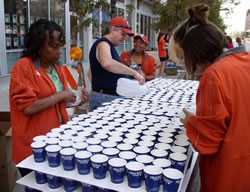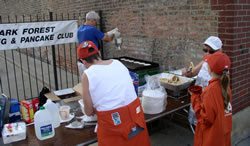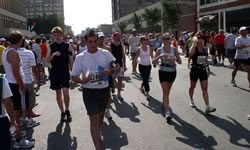
Updated Tuesday, October 16, 2007, 6:55 p.m. with more information from volunteers
Park Forest, IL–(ENEWSPF)– Members of the Park Forest Running and Pancake club used their email list and online forum to vent and share stories from this year’s Chicago Marathon, which many runners are dubbing, "The Chicago Inferno." No club members were hospitalized, but one finisher was lightheaded and received and IV on site. Club members also staff the 25-mile water stop, and it was evident early on that this Marathon sported an extra-thirsty clientele.
Michel, who writes to club members with the pen-name RunOnHeart, perhaps expressed most succinctly the pain runners felt , "Yesterday was the single toughest thing I have ever done…including childbirth. The best way to describe it…it was a WAR zone…ambulances, fire trucks…police …helecopters. ….noise. ..people everywhere just WALKING..determined …to get to the end."
The determination of many to finish grew as the long day continued, "I was at mile 20 when I heard that the race had been flagged. There was this defiant wave that went over the crowd. No one stopped running. We all cheered each other on….as we got to 23…you could see it in the eyes of everyone there…the finish line, no matter what, even if we had to crawl. By the time I got to 23 water was iffy….they had run out, you could not cool off. All the hydrants were open. There was very little water pressure, so the only thing getting wet were our feet. I made a decision to walk at 23 because of lack of water…and the effort I would have had to put into weaving. As I walked with the rest of the crowd, intermittently ambulances.. .and city busses procured for emergency services flew down the right side of the road…helicopters were everywhere.. .. At mile 25 I met up with Judge Ray [Funderburk]…I got the biggest hug! I felt like I was, at last, home."
Club President Carolyn Vander Velde expressed gratitude to members at the water stop, "Thanks so much to our Water Stop Heros, Mark Leschuk, Dick Macknick, Ray Funderburk, Toms Nowak and Nixon, Gary Kopycinski, Denise Evans, Joe Wenckus, Russ Johnson, Chuck Goodman – hope I didn’t forget any others. I never got to our water stop – got redirected at mile 16. I am sure our Dr. Mark McKeigue was extremely busy."

Kate Caldwell provided names of other club volunteers at the water station, "Well, Carol did forget some very important people, but I can fill in the folks that I knew were working the water stop: Pete Caldwell Katie Caldwell Vanessa Caldwell Therese Caldwell Jessica Prince Bill Churchill Mark (pancake meister) Anna (church group member from Matteson) Glenda (church group member from Matteson) More folks whose names I don’t know, residents who helped us clean up the street The streets were messier than usual and we had the recyclables organized along the sidewalks and all of the trash in garbage bags (Vanessa designed the bags to be standing up on their own which sped things up) by the time the City of Chicago recycle trucks arrived."
Caldwell confirmed this was unlike any other Chicago Marathon that preceded it, "There were a lot of big city busses, police vehicles, ambulances, and helicopters coming through the middle and flying over the endless groups of walking runners in intimidating fashion. Last look, 6 hours and 43 minutes people were still coming in. I saw two people collapse at mile 25. One looked very serious (a female runner who was around the 4:00 range). Therese saw three people collapse and saw two wheeled away in wheel chairs. Pete saw four people collapse. Keep in mind that they were standing in the same area and probably saw some of the same people. The gatorade, 5 levels high, didn’t move.
"People were desperately seeking water, which was the next set of tables up ahead. Trevor was our water hero and ran down boxes and boxes of water on a cart to the our gatorade section for us to either douse their heads or satiate dry mouths. Some of us were running boxes down as well. The Hinkley water section didn’t run out of water. There were still jugs left when we cleaned up. The general look on the marathoner’s faces was one of normal race determination, and lots of smiles between 5 hours and the end. I never saw so much appreciation and relief as we dumped water on their heads or poured it their cups or mouths. I only saw one person cry. No one seemed phased by the warzone-like atmosphere. They were just going to finish."
Judge Ray Funderburk has volunteered for many years at the 25-mile water stop. He expressed gratitude to the more than 250 volunteers who showed up at 7:30 a.m. on South Michigan Ave. to help, but frustration that so many left for the big clean-up, "I certainly want to give a yoeman’s thanks to all the volunteers. The volunteers have to be more conscious to stay off the streets and not impede the runners. It was an awful task to keep them off the street. In the end, there were only a few volunteers left for the massive cleanup that remained. All our young volunteers, and most others, were gone."
Funderburk commented on the conditions, "It was just unbearable, and oppressively warm. I think the medical director and those in a position of power made the right decision. It could have been a lot worse than it was.”
Dr. McKeigue described the scene as if his medical tent was part of a MASH unit, "It will take a while to digest this one, but this is the 12th year that I have volunteered as a doc at the marathon. I NEVER had to start an IV at our station (I’m usually at the 23 mile mark),NEVER sent anyone to an ER, and usually had 4 or 5 runners taken to the finish line main medical tent for further evaluation and treatment. Yesterday (I was at the 24.2 mile med station)I started 5 IV’s, sent about a dozen runners to main medical, and had another dozen or so taken to ER’s."
McKeigue continued, "I also had to physically carry a collapsed young lady about 0.3 mile back to our med station for treatment, and had my med students and nurses running up and down the street in wheelchairs collecting other downed runners. We did have enough water and ice, but would have run out if they hadn’t shortened the race and cut out several thousand people from ever reaching us. I don’t even know what else to say at this point. I’m just glad that it wasn’t worse, and that I didn’t have to treat any of my fellow Pancakersor Striders."
Runner Cindy Trotier summed up the race in one word, "Brutal." She continued, "What a way to find out what a person can endure. Though never having had full marathon experience, I was well aware (by experience) what heat exhaustion could do. I got to run a few miles with [club member] TIO2, then I slowed down because I could not keep up the pace for the rest of the race. After13 miles, I knew it was going to be tough and I would have to break down and walk/run the course in order to not let dehydration completely take over. In my case, I was fortunate enough to have plenty of water/Gatorade at my stops. I took advantage of every water hose, ice cube and encouragement from the crowd that I could muster. We were all trying to get to our final destination without having to collapse on the sidelines. As you know, I trained for the event (perhaps should have trained better), but even in doing so, could not fight off the heat and dehydration that came along with it. My goal then changed from hitting a time, to finishing the race."
Trotier had kind words for fellow club members, "Thanks to the Park Forest Pancake/Running Club and I-Runs for getting me through this. I don’t think I could have made it without you guys. You are a great inspiration, generous with your valuable knowledge and good peoples."

Criticisms of Marathon Management
Many club members expressed dissatisfaction with race director Carey Pinkowski and the general management of this year’s marathon. Steve Kwas confirmed that there was a lack of water on the course, "Whether they thought they had enough [water] or not, the fact is they didn’t. The second water stop, in particular, had nothing. People were drinking from decorative fountains in Lincoln Park and in front of [Lake Shore Drive] hi-rises. We aren’t making it up. All I’m asking is for the organizers to be truthful. There were problems. Whether they could have been avoided or not is a different issue. Denying that problems existed reeks of ‘CYA’.
"This was once-in-a-century weather. I do not hold organizers accountable for that. Volunteers were doing their best and I thank them for their help. It is unexcuable to run out of supplies. This weather was not a surprise. It was in the forecast for a week. More help was needed but it can’t be expected on a week’s notice. I applaud Pinkowski for making an unpopular decision to cancel the race. But I find it downright insulting that he is stating that they had enough supplies."
Kwas added that he did see an interview with Pinkowski admitting there was a lack of water, attributed it to runners using it for cooling instead of hydration. " Better late than never. I can happily ‘let it go’ now."
Julie Musselman was not pleased with Pinkowski’s acknowledgement, "First and foremost, I am so grateful that everyone in the group is ok. I was almost at 21 when the race was called. I was allowed to finish, but was told the race was officially over and there will be no times, but you will get a medal. So I ‘shuffled’ along with others to the finish."
"One thing I can’t seem to forgive, however, is Carey Pinkowski’s explanation or ‘excuse.’ To blame the runner for using the water to pour on themselves is absolutely shameful. Maybe that sounds extreme to some of you, but I truly believe that. I went back and re-read an article from Runner’s World printed online last week and it said ‘be sure to splash water over your head, trunk, and upper legs if it’s warm.’ Is Mr. Pinkowski the only person who did not plan that people would do that!
"Each time I hear that excuse of even think about it, it makes my blood boil. I wasn’t one of those people who wanted a refund until I kept hearing him blame the runners. In addition, I also went back and reread a Chicago Tribune article printed before the race that said that there will be misters attached to fire hydrants along the course. I honestly didn’t see them and didn’t get any type of fire hydrant relief until AFTER they called the race. With that kind of extreme heat, I think ice should be more accessable as well – another life saver when I found it.
"To end on a positive note, I will not remember this marathon for the negative aspects but for the tremendous community support. There are days when I think that nobody cares about anyone but themselves, but that day, I truly saw something different and I won’t forget that. Thanks to everyone in the group for the support and great suggestions in order to get through that rough day."
Chris Chapan was able to finish, but was also critical of Pinkowski, "Actually I felt great during the whole race which is unusual for me because I recently did a 5K and a half marathon and I felt worse. Unfortunately I did not get to finish. There were several water and even more Gatorade spots that did not have hydration. I am thankful for the volunteers who hosed us down and the Red Cross for the water. But I am quite upset that there was not enough water. They knew for many days we were going to have weather like this and that is unacceptable. Milwakee had their marathon and it was similar in temperatures. I may do that one next year."
Runner Glenn Benjamin felt Pinkowski’s call to end the race was correct, but was still upset with the way authorities ended the race. Benjamin said police parked a bus across Cermak, directing runners north to Grant Park. According to Benjamin, runners were told runners they would be arrested if they passed the bus and continued on the course, "We drank water and gatorade at every stop, did all we trained for and when we were pulled off the course just after 20 miles we were angry. No PISSED! We know we could have gutted it out, but afterward I know that the Race Director made the right call. It was a battle zone out there and I know we all saw runners struggling and down on the ground. We walked about 2 miles till we reached our 25 mile Water Stop. It was great to see your smiling faces!"
David Mauger commented, "The 2007 Chicago Marathon will probably be a day that the race organizers and the City of Chicago will probably fast want to forget. But, it will be a day that lives in infamy. It was truly ‘To Hell & Back’, and I plan to add that lettering to the personalized Tech-T I wore that day.
"Although the actual recorded weather observations during the race were less than the forecast, they were quite close to the forecast high of 90. But since there are no weather instruments on-the-ground along the actual race course, one can only speculate what the micro-weather conditions actually were in the concrete jungle we ran through."
Many club members just wanted to put this race behind them, and prepare for their next marathon.








